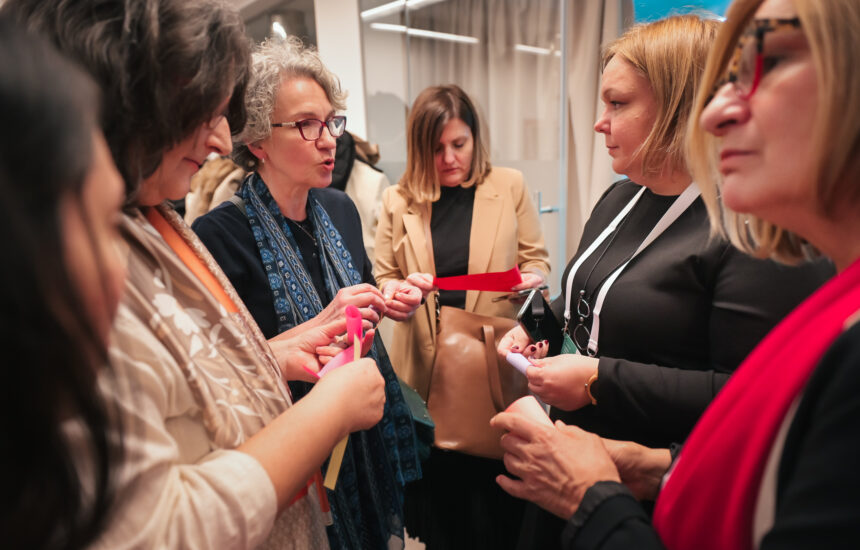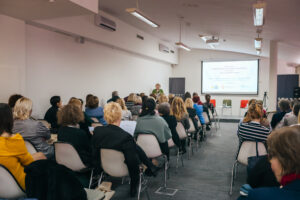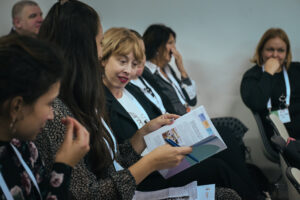Conference for Social-Emotional Character Development in Serbia: Promoting Character-Building in Schools


In December, Childhood Education International gathered with teachers, school staff, and colleagues from the Center for Interactive Pedagogy (CIP Centar) for a conference in Belgrade, Serbia. They were joined by representatives from the Ministry of Education of Serbia, Save the Children Western Balkans, UNICEF, the University of Belgrade, the the Institute for the Improvement of Education and Upbringing.
During a two-day period, more than 80 stakeholders and participants discussed and reviewed the outcomes of the two-and-a-half-year-long program Social-emotional Character Development in Primary Schools: A Community of Practice Framework, supported by the John Templeton Foundation.

Conference participants attending a presentation.
At the event, schools shared insights on their communities of practice and participatory action research. They also discussed how they worked together to solve issues in their schools and came up with solutions by using a community-wide, human-centered approach.
Schools also shared plans for how they will continue to integrate Social-Emotional Character Development (SECD), also known as Social-Emotional Learning (SEL), for continued professional capacity-building and for strengthening students’ social-emotional competencies and behavior at school.
“The knowledge and skills I’ve gained over the past two years have allowed me to implement these concepts effectively in all the classes and seminars I have attended,” said Mirjana, one of the teachers from a participating school in Pančevo, Serbia. “The feedback from the children after each workshop was positive and helpful, motivating me to continue working and learning. The atmosphere in the classroom was productive for both learning and building reassuring relationships.”
When schools build their capacities to understand and use SECD (SEL), this can lead to stronger academic performance, greater social inclusion, and more use of democratic values and governance at schools and homes.
Research partners from the University of Belgrade Faculty of Philosophy presented research results from the program at the conference. They noted that teachers and school staff felt more confident in building students’ social-emotional skills and talking to other colleagues about how they were feeling in the profession. Students showed growth in their decision-making skills, as well as how they viewed themselves and included others.
“In nurturing the social-emotional character of our children and fostering communities of practice, we build bridges of acceptance and understanding,” said Boris Spasić, Executive Director of CIP Centar in Belgrade, Serbia. “Our evaluations have shown us the power of these efforts regarding the higher sensitivity of students to the concepts of social justice and equity and subsequently the heartwarming embrace of peers from vulnerable groups. Together, we create a world where every child feels seen, valued, and accepted. “
Indeed, the overall program has widely benefitted schools and children alike, and the conference was a forum for gathering these schools to share in how social-emotional character building is vital across more and more schools.
Throughout the conference, teachers and school staff were engaged and receptive to learning from each other, thus continuing the horizontal learning exchange and communities of practice that they have been conducting throughout the program period.
Horizontal learning and giving teachers and school staff voice in this conference was emphasized during this conference. The schools that participated expressed a desire to embed SECD in all subject matters, noting that students cannot learn and cannot succeed unless we all consider their character and environment, and how education can help shape students into young people who are self- and socially aware.
There were also opportunities during the conference for the students to share their voices, through videos and through messages of hope that were handed out to each conference participant.

Conference attendees looking at the SECD Guidelines document during the conference.
“This conference was so valuable because we were able to give an opportunity for schools to share their experiences, to communicate what they found in developing and implementing their own SEL activities, and to find solidarity with other schools who want to learn how to integrate more SEL in their curricula,” said Katherine Tek, Practice Lead for Wellbeing and Senior Project Manager at CE International, who oversaw the program since its inception. “I’m so pleased that throughout this program, we at CE International have been able to co-create and collaborate with our partners at CIP Centar and with all participating schools and stakeholders.”
CE International is pleased that along with the conference, the program has also led to other outputs, such as accreditation of three SECD/SEL Training Modules by the Ministry of Education in Serbia. These modules can now be used by any schools or learning entities in the country.
We have also published Guidelines for SECD/SEL Integration in Schools, as well as a Framework for SEL Integration Schoolwide, to be used as a foundation for further dissemination and implementation of SEL in Serbia. The Guidelines, along with a resource compendium of SECD / SEL materials and information (all in Serbian), are available for free on CIP Centar’s SEL Resource Compendium website.
Below are several photos from the conference.
We are hopeful that the SECD initiatives in Serbian schools continues and that we will continue collaboration together. For now, we are so pleased with the success of the program from 2022-2025, and we continue to support the use of SECD/SEL with practitioners, caregivers, students, and children for their growth and development.
U decembru su se kolege iz organizacije Childhood Education International okupile na konferenciji u Beogradu, Srbija, zajedno sa kolegama iz Centra za interaktivnu pedagogiju (CIP Centar), kao i predstavnicima Ministarstva prosvete Republike Srbije, Save the Children kancelarija za severozapadni Balkan, UNICEF-a, Univerziteta u Beogradu, Zavoda za unapređivanje obrazovanja i vaspitanja, kao i nastavnicima i drugim zaposlenima u školama iz Srbije.
Tokom dvodnevnog skupa, više od 80 učesnika i zainteresovanih strana razgovaralo je o ishodima programa „Zajednica praktičara za socijalno – emocionalno učenje u funkciji podrške razvoju ličnosti učenika/ica”, koji je trajao dve i po godine i koji je podržala Fondacija Džon Templton (John Templeton Foundation).

Conference participants attending a presentation.
Na događaju su škole podelile uvide o svojim zajednicama prakse i participativnim akcionim istraživanjima. Takođe su razgovarali o načinima na koje su zajedničkim radom rešavali izazove u svojim školama, koristeći pristup koji je fokusiran na celu zajednicu i na ljude.
Škole su takođe predstavile planove za nastavak integracije Socio-emocionalnog učenja (SEU) u učionice i škole s ciljem daljeg razvoja profesionalnih kapaciteta nastavnika i jačanja socio-emocionalnih kompetencija učenika u školama.
„Znanja i veštine koje sam stekla tokom protekle dve godine omogućile su mi da efikasno primenjujem ove koncepte u nastavi“ rekla je Mirjana, jedna od učiteljica iz škole u Pančevu. „Povratne informacije od dece posle svake radionice bile su pozitivne i korisne, što me je motivisalo da nastavim sa učenjem i radom. Atmosfera u učionici bila je podsticajna, i za učenje i za izgradnju sigurnih odnosa.“
Istraživanja pokazuju da kada škole unaprede kapacitete za razumevanje i primenu metoda SEU, dolazi do poboljšanja akademskih rezultata, veće socijalne inkluzije i šire primene demokratskih vrednosti i upravljanja u školama i porodicama. Istraživači partneri sa Filozofskog fakulteta Univerziteta u Beogradu predstavili su rezultate istraživanja u okviru programa.
Nastavnici i zaposleni u školi stekli su veće samopouzdanje u izgradnji socio-emocionalnih veština kod učenika i razgovoraju sa kolegama o izazovima u profesiji. Učenici su pokazali napredak u donošenju odluka, percepciji sebe i prihvatanju drugih.
„Negujući socio-emocionalne kompetencije naše dece i razvijajući zajednice prakse, gradimo mostove prihvatanja i razumevanja,“ rekao je Boris Spasić, izvršni direktor CIP Centra u Beogradu. „Naša evaluacija nam je pokazala koliko su ove aktivnosti značajne – učenici su postali osetljiviji na pojmove socijalne pravde i jednakosti, što je dovelo do toplijeg i otvorenijeg prihvatanja vršnjaka iz osetljivih grupa. Zajedno stvaramo svet u kojem se svako dete oseća viđeno, cenjeno i prihvaćeno.“
Zaista, program je doneo mnoge koristi školama i deci, a konferencija je bila prilika da se škole okupe i podele svoja iskustva o značaju izgradnje socio-emocionalnih kompetencija sa što većim brojem škola.
Tokom konferencije, nastavnici i drugi zaposleni u školi aktivno su učili jedni od drugih, nastavljajući horizontalnu razmenu znanja i zajednice prakse koje su razvijali tokom programa.
Poseban naglasak stavljen je na horizontalno učenje i davanje glasa nastavnicima i drugima zaposlenima u školi. Škole koje su učestvovale izrazile su želju da SEU bude integrisano u sve predmete, ističući da učenici ne mogu da napreduju ako se ne uzme u obzir njihova ličnost i okruženje, kao i uloga obrazovanja u oblikovanju mladih ljudi koji su svesni sebe i društva.
Učenici su takođe dobili priliku da izraze svoja mišljenja – kroz video snimke i poruke nade koje su podeljene svim učesnicima konferencije.

Conference attendees looking at the SECD Guidelines document during the conference.
„Ova konferencija je bila izuzetno vredna jer smo omogućili školama da podele svoja iskustva, razmene saznanja o razvoju i implementaciji aktivnosti socijalno-emocionalnog učenja i pokažu solidarnost sa drugim školama koje žele da integrišu SEU u svoje kurikulume,“ rekla je Katherine Tek, vodeća ekspertkinja za dobrobit i viša projektna menadžerka u CE International, koja je nadgledala program od njegovog početka. „Veoma sam zadovoljna što smo kroz ovaj program uspeli da ko-kreiramo i sarađujemo sa partnerima iz CIP Centra i svim školama.“
CE International sa zadovoljstvom ističe da je pored konferencije, program doveo do dodatnih rezultata, uključujući akreditaciju tri modula obuke o socijalno-emocionalnom učenju od strane Ministarstva prosvete Srbije. Ovi moduli sada mogu biti korišćeni u svim školama i obrazovnim institucijama u zemlji.
Takođe smo objavili Smernice za integraciju SEU u školama, kao i Vodič za škole: model integrisanja socijalno-emocionalnog učenja u prakse škola, koji može biti osnova za širenje i implementaciju SEU na nacionalnom nivou u Srbiji. Smernice, zajedno sa zbirkom resursa i materijala na srpskom jeziku, dostupne su besplatno na veb stranici CIP Centra.
Испод је неколико фотографија са конференције.
Nadamo se da će inicijative za integraciju socijalno-emocionalnog učenja u srpskim školama nastaviti da se razvijaju i da ćemo nastaviti našu saradnju. Za sada, izuzetno smo zadovoljni uspehom programa od 2022. do 2025. godine i nastavljamo da podržavamo primenu SEU metoda u radu sa nastavnicima, roditeljima, učenicima i decom radi njihovog ličnog i profesionalnog rasta i razvoja.